This week, after much anticipation and excitement the new version of
23andme‘s Ancestry Painting was released! This new version, which replaced Ancestry Painting, is now known as Ancestry Composition. Ancestry Painting lacked populations which only used three main populations Asian (from China/Japan), European (which I think were US-European samples), and then African (using Yoruba samples from Africa). The issue with this was that many people for example that got Asian, couldn’t differentiate between Native American Asian and East/South Asian. Ancestry Composition on the other hand has 22 populations which includes samples from all around world. Ancestry Composition is still in its infancy, seeing as it how just came out a few days ago, and there will be much to sort out and update. For example, currently Ancestry Composition can only separate West African and North African. This is unfortunate for many African gene-carrying individuals like myself who have no idea where specifically in Africa their genes came from. 23andme did state that the current African cluster will be broken down further but they are running tests to make sure everything will be in order. So without further ado, here is a Puerto Rican look into Ancestry Composition! [Note: results are still changing around, so these numbers and values are only applicable right now. Things may reflect differently later on.]
 |
| My Ancestry Composition |
So this is who I am; at least as of a few days ago! Percentages have gone up and down compared to the old Ancestry Painting. We see that my European is significantly lower than what it used to be (75%) and my other levels pretty much stayed the same. 16.1% of me is still unassigned which means that as more samples are collected, hopefully this 16% can find a home for itself amongst the colorful bars. As you can see there are a few tabs on top. The first one called “Map View” allows you also to see “Split View” and “Chromosome View” which I’ll show in a bit. Split view only works if you have tested either both or one of your parents and Chromosome View is similar in appearance to the old Ancestry Painting. Also you can see a tab called “Global Resolution” which allows you to hone in more on the various populations which are included. Then you see my name, which you can choose to see other people you’re sharing with then you see “Standard Estimate”. If you click on that tab, you get “Speculative Estimate”, “Standard Estimate”, and “Conservative Estimate”. I’m not too sure on what exactly the defining difference is between them but I’ll show you images of Standard and Speculative so you can see how they differ. Now, I’ll show you a more in-depth Global Resolution:
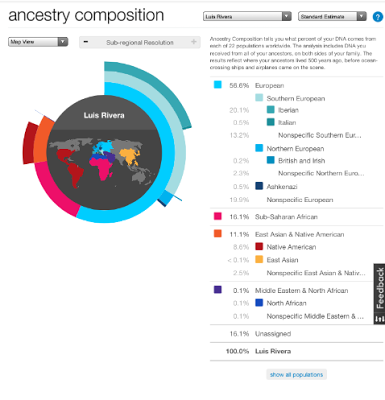 |
| My Ancestry Composition- Standard Estimate |
Here you can see various populations which can be found in my DNA. There are some interesting and some expected ones. With European you can see that I’m further broken down into Southern and Northern European, and then from there even more. So 20.1% is Iberian which is very expected and 0.5% Italian which is also sorta expected. Then I get 0.2% British and French, which is interesting since in AncestryDNA I get 13% British Isles. Also I want to point out the “Nonspecific Southern European” and “Nonspecific Northern European”. These mean that segments of my DNA can be found amongst these groups yet are widely distributed amongst them that they can’t pinpoint exactly which subgroup it belongs to. So there could be more British in there somewhere amongst the 19.9% but isn’t specific to just the British Isles. Interestingly enough I get Ashkenazi at 0.5%, I’ve seen cousins in my Ancestry Finder who claim Ashkenazi Jewish roots so I knew somewhere far back I’d have to have some too. It most likely comes from old Spanish Jewish roots or maybe a Eastern European ancestor which is also very possible. Then you can see I have 16.1% Sub-Saharan African which includes all of West, Central, Eastern and Southern Africa- my ancestry from there most likely comes from Western Africa due to the slave trade. Next you can see 11.1% East Asian and Native American, with a 8.6% further divided into Native American- definitely real and most likely from my Taino ancestors (there were also Arawaks, Caribs and even Mayan from Mexico present in Puerto Rico (Mayan through labor trades), then a <0.1% East Asian which I’m guessing is just noise and then you can see 2.5% Nonspecific East Asian and Native American. Lastly, you can see 0.1% which arrives from Northern Africa. My Speculative Estimate tells a little bit of a different story!
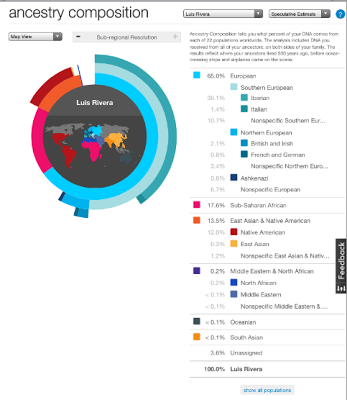 |
| My Ancestry Composition- Speculative Estimate |
I tend to lean more to this estimate which to me hopefully fits more of my ancestry. I say this because with my Martiniquan ancestors, there should have been some French estimated into my percentages (of course, if no French ever mingled with my ancestors that could be possible as well, but in those times slaves were mistreated as well as raped). I’ll let you glance at it, I don’t want to make this post too long. You can see some numbers have gone up while others have gone done. But still, 100% me 🙂 Next I’ll show you the Split View option which I can see since I’ve test at least one parent.
 |
| My Ancestry Composition- Split View |
So here you can see how I’ve inherited from my mother’s and father’s side. My mother’s side gave me more unassigned as well as much more Sub-Saharan African yet less European. You can also see that the 0.1% North African I receive earlier in my Map View comes from my mother’s side of the family. Interestingly, both sides gave me roughly 5-6% East Asian & Native American. Split view is an awesome option for those who might have tested only one parent or wants to figure out which side of the family gave them what. The next few shots will include different “Chromosome View”snapshots.
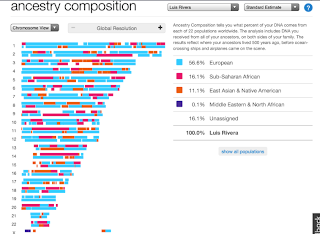 |
| My Ancestry Composition- Chromosome View |
So I’ll begin of course with my Standard Estimate of the Chromosome View. As you can there are a ton of nice colors flowing in and out throughout my chromosomes, this is my gene’s artwork. Here you can see two bars for each chromosome, except the X which I received one of from my mother. The DNA has also been phased with smoothes out a lot of the colors allowing it to flow easier instead of looking like this (the old Ancestry Painting image with spliced chunks of colors):
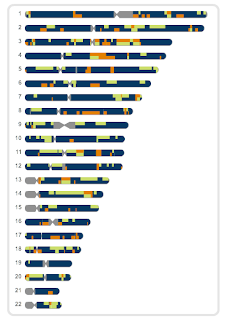 |
| My Ancestry Painting |
Now I want to show you my Speculative Estimate with all the previous populations from the Map View. Here is how they change up my DNA colors:
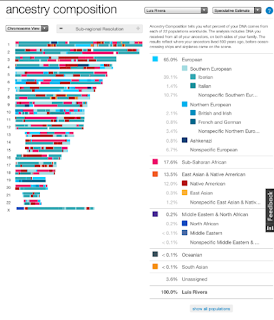 |
| My Ancestry Composition- Speculative Estimate |
Here you can see all the further divided colors and what’s cool about the new Ancestry Composition is that it’s a bit interactive. Meaning that if I want to see where in your DNA a certain population appears you can click on the population and that color becomes isolated while the others fade a bit away allowing you to see those pieces of your genes. For example, I did it twice with my Ashkenazi genes as well as my French and German genes:
 |
| My Ancestry Composition- Ashkenazi Population |
 |
| My Ancestry Composition- French/German Population |
What’s very interesting is that practically one of my pairs from Chromosome 19 is practically all French/German. Interestingly none of my other family members receive such a huge chunk. Also, you can see the spread out pieces of Ashkenazi genes, one of them on Chromosome 1. Interestingly enough, I match a German/Polish cousin who has Ashkenazi genes on that same chromosome and most likely on that same spot. (I’ll probably dedicate another post to that match). Lastly I want to show you my grandfather’s Chromosome View with Sub-Saharan African highlighted. He is who has received genes from his 2nd great grandparents from Martinique. You can see he has received a lot of long African segments due to his relatively close ancestry with slaves.
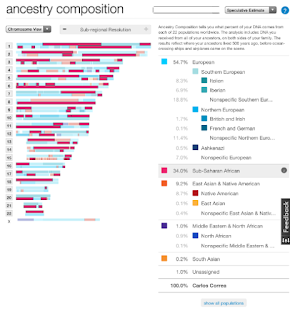 |
| Abuelo’s Ancestry Composition- Sub-Saharan African Population |
You can also see he has French/German ancestry (I want to point out this is the Speculative View which I feel is more correct to my family history). I’m no expert on DNA and genes but I’m learning a lot from these results about my family and what I carry and hopefully one day pass to my children. You can see that there are a lot of populations/ areas of the world which contribute to who I am and hopefully one day I’ll know more stories of my African ancestry as well as my Native and European ancestry. Hopefully soon enough Sub-Saraharan will be divided further but until then I’m happy so far with these results! I’ll keep posting about interesting finds with the new Ancestry Composition!










